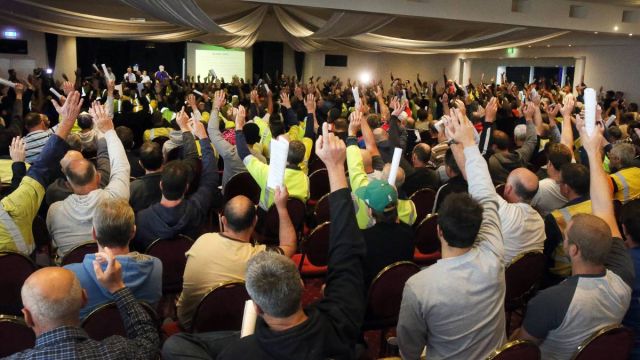
Enterprise bargaining is the only way that workers and their unions can legally seek wage increases. Since the system was first introduced by a federal Labor government in 1993, it has achieved its deliberate, but unstated, aim of lowering aggregate wages and increasing profits.
When Australian Workers Union (AWU) delegates and officials met with BlueScope Steel company representatives to negotiate a new agreement for the workforce at Port Kembla, they received not an offer but an ultimatum: agree to 500 workers being retrenched or the steelworks will be shut down with the loss of 5000 jobs.
As it turned out, this wasn't the only concession that BlueScope demanded. As well as the so-called “restructuring” — read job losses — the company also wanted the workers to agree to a three-year enterprise agreement with no wage increases and the suspension of an existing bonus scheme.
The unions responded with a proposal that both the New South Wales and federal governments mandate that 50% Australian steel be used on all domestic infrastructure projects to soak up surplus capacity. This was rejected.
At a mass meeting held on October 12, the union described the company's proposal as “a filthy rotten package” but urged workers to vote for it or “we'll see you in the dole queue”.
They did, although ABC News described “heated exchanges” and some workers told the reporters they were “selling themselves”.
BlueScope Steel has been in deep trouble for some years. In 2009, the company was exporting 50% of its steel production on the back of blast furnace efficiency well above world average.
But in 2011, it closed its No. 6 blast furnace and retreated from the export market, cutting 1000 jobs.
One obvious aspect of the difficulty that the company and its workers find themselves in is competition from China. As the Chinese economy contracts from its always unsustainable high growth rates, it is exporting more of the steel it produces. These exports are estimated to top 100 million tonnes this year.
BlueScope's total raw steel output capacity from Port Kembla is 2.6 million tonnes a year, of which about 500,000 tonnes is surplus to its present domestic market sales. This surplus loses about $100 million a year when it is exported onto a glutted global market. The company's solution to this is to cut $200 million in its annual costs.
Although the AWU vote represents only $60 million of this, BlueScope's chief executive Paul O'Malley welcomed the outcome.
He is reported as saying: “If it had been a no vote, it would have been 5000 jobs gone. So the yes vote today saves 4500 jobs and gives us a lot of confidence we can get the $200 million.”
Some of this is expected to come from the NSW state government. BlueScope wants the government to relieve it of the burden of paying $28 million in payroll tax and another $5 million in compliance costs associated with the Environmental Protection Agency and Work Cover.
But the other important aspect is that BlueScope's former parent company, BHP Billiton, has elected to demerge BlueScope at the same time as China became a serious competitive threat.
The steelworks would have been much better positioned to meet international competition as part of an integrated company producing iron ore and coking coal for steelmaking than as a stand-alone steelmaker.
Now, according to O'Malley, the biggest concern facing the company is the prospect of carbon taxes. The inference is that the company has a right to profit from its pollution rather than pay to abate it, and the Illawarra community should be thankful for their polluted skies because jobs depend on it.
Solving the pollution problem is another opportunity squandered. In 2009, secretary of the South Coast Labour Council Arthur Rorris initiated a research project that proposed an action plan for creating green jobs in the region.
Although the blueprint was largely ignored, one of the proposals discussed was the construction of a cogeneration power plant at the steelworks which could create an estimated 2000 jobs over a three-year construction phase.
It would have abated up to 1 million tonnes of greenhouse gas emissions a year that would otherwise have resulted from coalfired power generation — the largest carbon abatement project in the country.
It never happened because BlueScope said it couldn't afford the $1 billion price tag, and neither the federal nor the state government were prepared to examine how the costs could be ameliorated.
It could and still can be funded from the estimated $7 billion a year in taxes avoided by companies — including BHP Billiton — through the use of marketing hubs in Singapore.
But this seems as unlikely as O'Malley's contention that the steel cycle will turn sometime soon and leave the company well positioned to profit from the upturn.
Like the article? Subscribe to Green Left now! You can also like us on Facebook and follow us on Twitter.